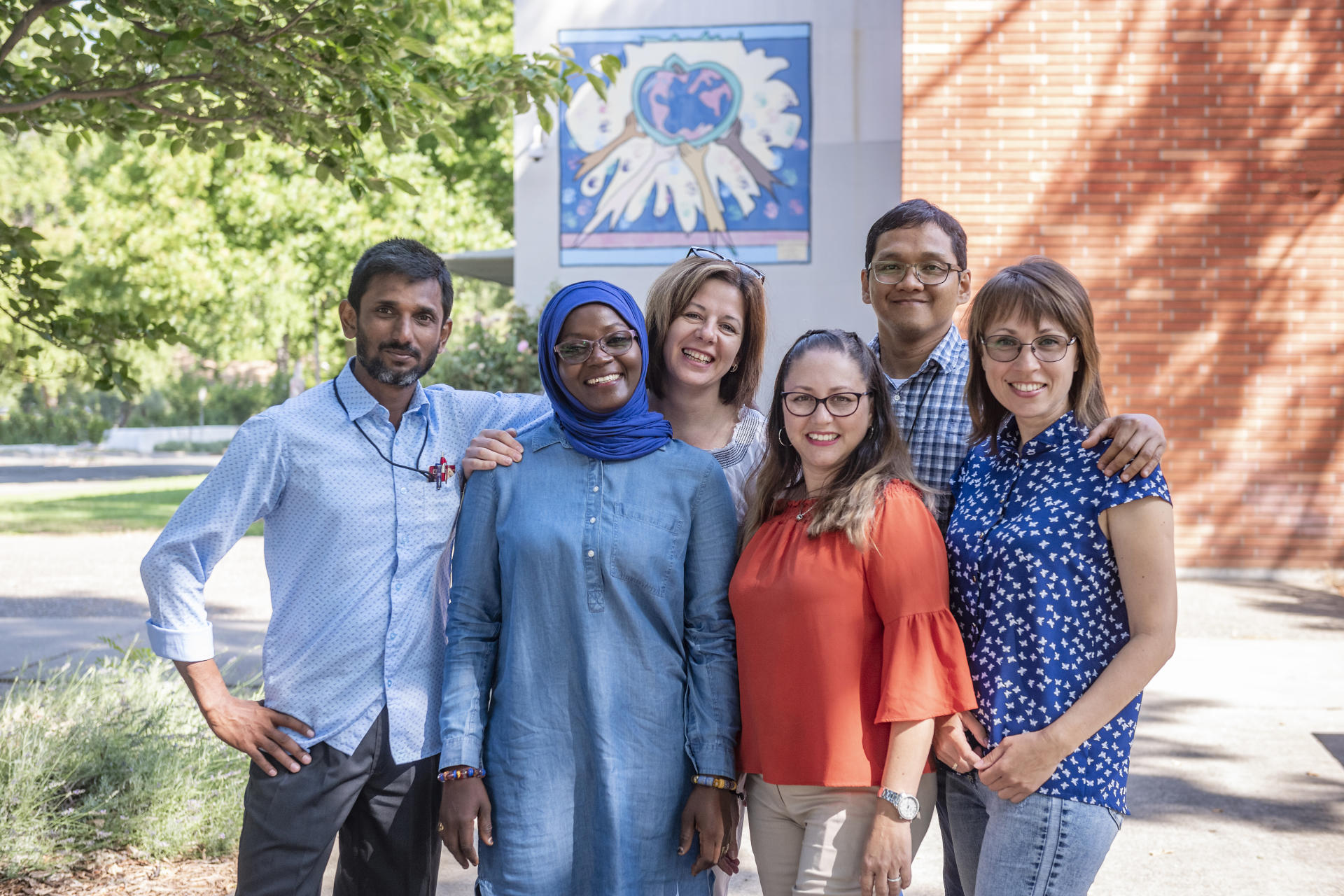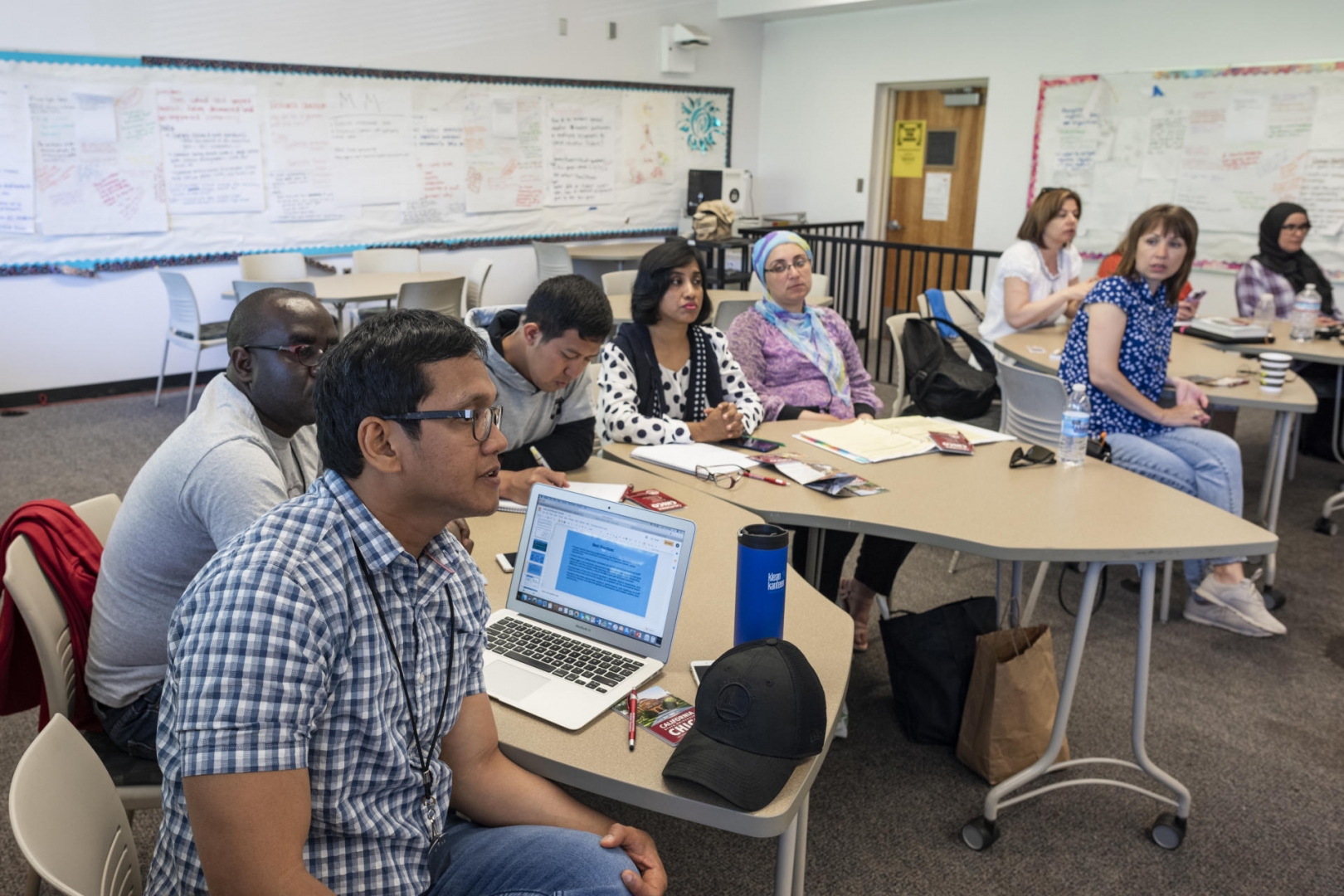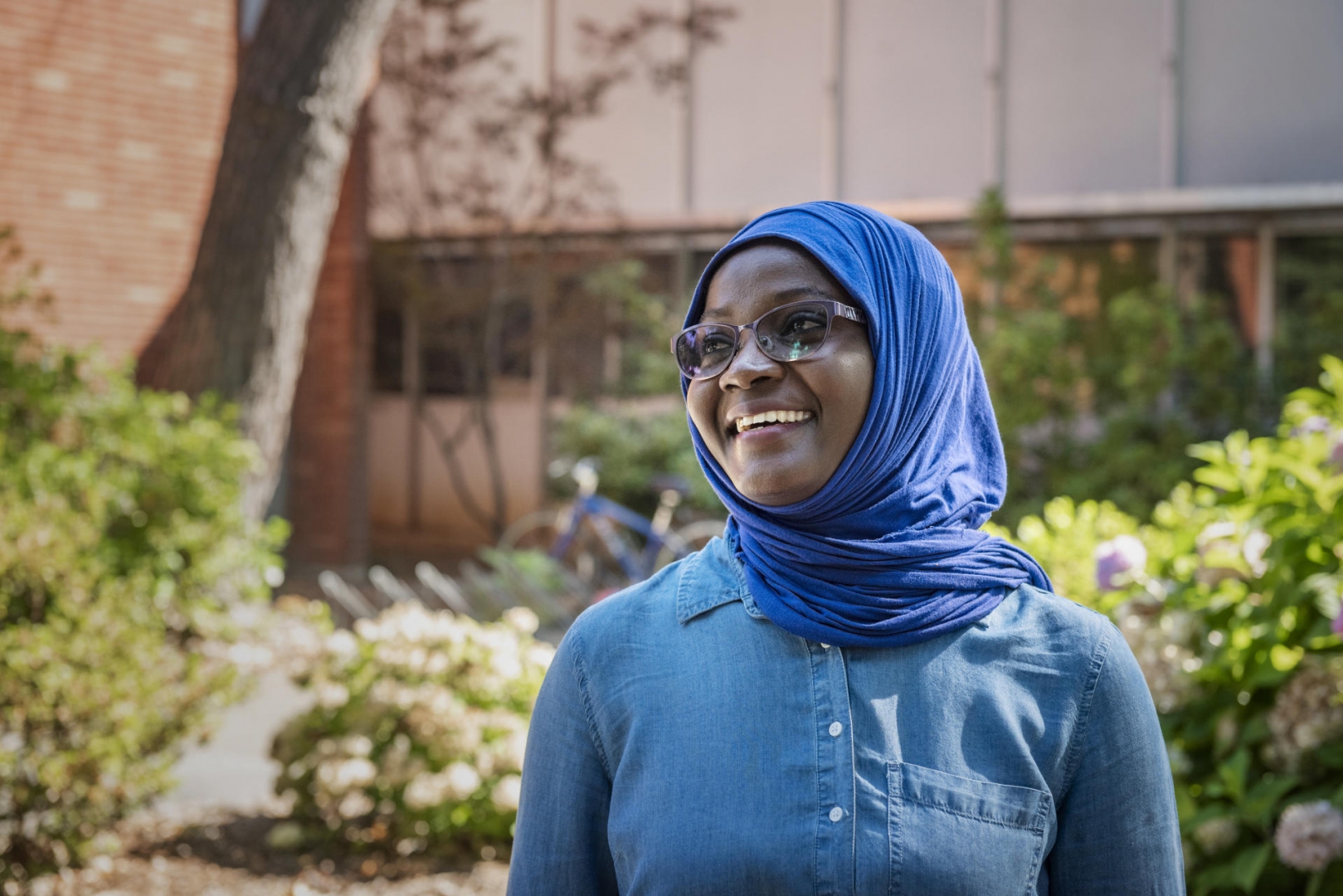Global Educators Learn About US Culture

Sadik Palassery (of India), Asmau Ayub (of Ghana), Carmen Ducu (of Romania), Merlyn Jiménez (of Costa Rica), Dennis Infante (of Philippines), and Natalia Kidalova (of Ukraine) are part of the visiting international scholars from around the world that gather together to learn about teaching courses, collaborating with Chico colleagues on research projects, and performing in a wide range of arts fields on Monday, July 8, 2019 in Chico, Calif. The global educators engage in the activities of the campus community, sharing their international and cultural experiences and perspectives, and providing rich learning opportunities for students, staff, faculty, and community members. The Office of International Education (OIE) oversees invitations of visiting scholars, including assisting the scholar in obtaining a J-1 Exchange Visitor visa if needed. (Jason Halley/University Photographer/CSU Chico)
Asmau Ayub is a high school counselor at Ghana Lebanon Islamic Secondary School in Accra, Ghana’s seaside capital city. She smiles deeply while she talks, and lights up when she speaks about last month’s visit to Ability First Sports’ annual summer camp, which takes place on the Chico State and Chico High School campuses.
As one of the nation’s only summer sports camps specifically designed for youth with physical disabilities, it provides expert instruction from world-class wheelchair athletes. It also provided Ayub, a self-described “social change activist” whose passions include advocacy work for marginalized communities in Ghaha, with an up-close view of the sports instruction. She noticed the difference it made in the athletes’ confidence, and she, too, felt empowered.
“This is what inclusion means to me,” she said, “where people can participate and actively be involved.”
Ayub is one of 20 global educators from as many countries who visited Chico State this summer during a five-week professional development institute hosted by the University’s Study of the US Institutes (SUSI) on Secondary Education. Through federal funding by the US Department of State, Chico State has continued to host groups like this every year since 1991.
Led by Diana Parks, project director at the University’s Office of International Education and Global Engagement, this summer’s group of visiting educators included experienced secondary school educators from around the world—from teachers and teacher trainers to curriculum developers and education ministry officials—seeking to deepen their understanding of US society, education, and culture. The theme was “Exploring Access and Equity in US Education and Society.”
From India and Argentina to Egypt and South Africa, these educators followed a meticulously mapped-out schedule during their time in the US, with the first two weeks acting as orientation in Chico. Lectures, presentations, and other educational experiences followed, peppered with visits to a charter school and the State Capitol in Sacramento, Chinatown and the Golden Gate Bridge in San Francisco, and a day of exploration in Lassen National Park—which still boasts plenty of snow, a first experience for some of the visiting educators.
For the last legs of their visit, the group traveled to Chicago and Washington, DC.

While the global educators arrived at Chico State prepared to learn from American educators, “we emphasize that this is not a one-way street,” Parks said. “Our goal is to learn from them, as well.”
After spending 11 years as an English teacher in Turkey, Dincer Demir is now a teacher trainer, primarily for his country’s public school system. Aside from learning that Northern Californians are friendly (“In Chico, we learned we can say ‘hello’ to everyone on the streets, even though we don’t know them,” he said), Demir’s goal for the institute was to take concrete and tangible techniques, methods, and strategies back and apply them to his work.
Demir said Turkey’s nearly 1 million public school teachers traditionally are severely limited to how much input they have in designing and carrying out their own curriculum—something he’d like to see change.
“The Minister of Education gives the teachers the curriculum, the syllabus, and the books, and the teachers apply it all,” Demir said. “The teachers cannot adapt the curriculum, cannot adapt the syllabus. We are just appliers, rather than designers, of education.”
Demir suggests tradition and cultural reasons are holding back Turkey’s educators—but he also contends changes are afoot to hand teachers more academic power freedom.
“We try to change it, a little bit at a time,” he said. “We’re moving slowly in this area. Maybe we’re in the changing process right now.”
Provided the space to learn from others and share his own experiences and ideas, Demir feels he has grown personally and professionally through the institute.
“I will have lots of new ideas to bring home. I feel I am better equipped and excited to do something new and to discover more,” he said. “This has been very special for me.”
Parks talks about the “multiplier effect,” the idea that when each visiting educator takes what they learned back home, they teach their colleagues or students, who then go on to share with other colleagues or students, and so on.
“It is my hope that this means an increase in mutual understanding between the people of the US and the people of other countries, and ultimately it will foster the development of peaceful relations among nations,” Parks said.
Meanwhile, she cautions educators that they are not learning one-size-fits-all lessons.
“It is critical to always keep in mind that each educator comes with a unique background, both in education levels, professional experience, and community cultural differences. The fun part of the discussions is to bring out those differences and learn from them. Some lively exchanges sometimes take place,” Parks said. “It is up to each person to decide how they can adapt what they are being exposed to here in the US to their home country’s educational system or curriculum. For some, it will be more difficult than others.”

Still, what the group gleans from their experience is likely to have profound effects on their individual teaching methods and curriculum, and could trickle down to the schools’ families. For example, Ayub said the hallways and stairways of her school, a mainstream campus, do not currently support students who use crutches or wheelchairs.
“That means if a parent has such a child, they cannot bring them to my school,” she said. “Which is not fair.”
After seeing what’s possible and gleaning new ideas from the institute—as well as educators from 19 other cultures—Ayub is energized to go through her copious amounts of notes and ultimately usher in change when she returns to Ghana.
“I’m really excited to go back home and to start the things I have learned from here,” she said, “and to see how best I can impact the people in my own community.”


